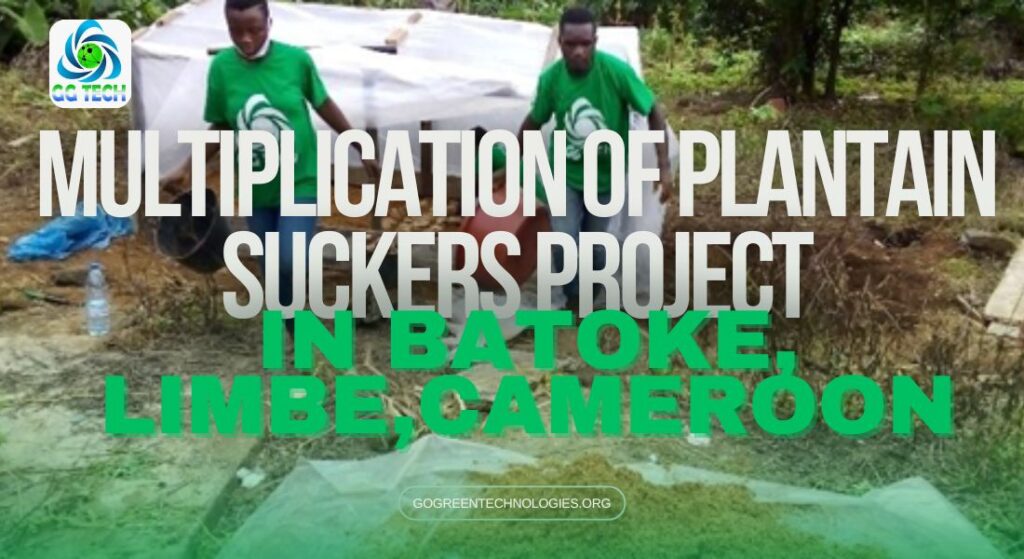Project Manager: Awejan Emmanuel
Project Coordinator: Mbulle Lorena
Project Sponsor: GoGreen Technologies(GG TECH)
Resource Manager: Ange Chrys Atiogo
Date: June 15 to October 15 2020
Location: Batoke, Limbe, South West Region, Cameroon
Organized by: GoGreen Technologies
Goal: To multiply of 200 plantain suckers to 2000 platelets to support local agriculture.
GoGreen Technologies successfully implemented a project focused on the multiplication of plantain suckers in Batoke, Limbe. The project was meticulously planned and executed in several phases to ensure efficiency and effectiveness.

Phase I: Evaluation and Planning
The initial phase involved a thorough evaluation of the materials required and the development of a detailed work plan. This included calculating the diameters necessary for constructing the propagator and ensuring all materials were adequately prepared.

Field Work
Materials were transported to the site, and the area was prepared by clearing stones and debris. The propagator was then constructed to the specified dimensions. Concurrently, plantain suckers were prepared through cleaning, scarification, and the production of X plants by exposing smaller buds and destroying the mother bud.


Disinfection of X Plants
The X plants and sawdust substrate underwent a disinfection process using fungicides and insecticides to prevent disease and pest infestation. This crucial step ensured a healthy start for the plantains.


This phase was all about introducing the X plant into a disinfection pull, where disinfectants were added into the water, that is a fungicide (Fungichamp 720WP) with active ingredient Cymoxanil 80g/kg+Mancozebe640g/kg and an insecticide (Cicapsid 50SC). These chemicals was used to both for the X plant and the substrate which was sawdust for disinfection.


Introduction into the Propagator
The disinfected X plants were systematically arranged in the propagator and covered with sawdust to regulate temperature and humidity. The propagator was sealed and maintained for approximately three weeks, during which the plantains began to sprout.
The phase 1 ended where the process of the plantain multiplication has been attained and the propagator is well sealed. Inside it, the temperature of the plant is controlled together with humidity. The propagator is closed for close to 3 weeks before sprouting starts.


Phase II: Polyethylene Bag Filling and Weaning
After three weeks, the sprouted plants were carefully weaned and transplanted into polyethylene bags filled with local soil. This phase ensured the young plantains could adapt to their new environment outside the propagator.

Phase III: Monitoring and Evaluation
The final phase involved regular follow-ups with clients to monitor the plantains’ adaptation to their new environment. This phase was critical for managing acclimatization before the plantains were transplanted into the field for continued growth.

Monitoring and Evaluation
Continuous follow-ups ensured the successful acclimatization and growth of the plantains before final field transplantation. Over a three-month period, an 80% survival rate of transplanted plantains was observed.
The project effectively increased plantain sucker production, contributing significantly to local agricultural development and providing a sustainable farming model for future initiatives in Cameroon. The multiplication project resulted in a 90% success rate in initial propagation and an 80% survival rate post-transplantation, demonstrating the project’s robust impact on agricultural sustainability.
Conclusion Of GoGreen Technologies Plantain Suckers Multiplication Project
The plantain sucker multiplication project demonstrated a systematic approach to plant propagation. By ensuring proper planning, execution, and follow-up, the project successfully laid the groundwork for sustainable plantain farming in the region. The project phases, from evaluation and disinfection to transplantation and monitoring, were meticulously executed, resulting in a promising increase in plantain sucker production. This initiative not only contributed to local agricultural development but also provided a model for future projects aimed at enhancing food security and sustainable farming practices in Cameroon.
The project achieved its goal of multiplying plantain suckers, supporting sustainable agriculture in Batoke. The systematic approach, from evaluation and planning to fieldwork and monitoring, ensured the plantains thrived, contributing to local agricultural development.
Learn more about GoGreen Technologies
Contact us Here
Or you can Join forces with us
